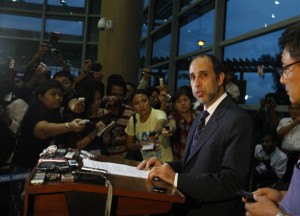UN Special Rapporteur Calls for Investigations, Accountability and Reconciliation in Burma
By Burma Partnership • August 6, 2012 Last week, Tomás Ojea Quintana, the United Nations Special Rapporteur on human rights in Burma undertook his sixth visit to the country. His statement upon leaving Rangoon touched on many crucial issues, including the release of political prisoners, the situation in Arakan State and the need for a truth commission.
Last week, Tomás Ojea Quintana, the United Nations Special Rapporteur on human rights in Burma undertook his sixth visit to the country. His statement upon leaving Rangoon touched on many crucial issues, including the release of political prisoners, the situation in Arakan State and the need for a truth commission.
Quintana welcomed the release of Phyo Wai Aung, a young man falsely accused, tortured and imprisoned for his alleged involvement in bombings during the Thingyan water festival in 2010. While this was a welcome gesture from President Thein Sein, the Assistance Association for Political Prisoners reports that there are an estimated 448 political prisoners still behind bars. Each of these individuals must be released immediately, for as Quintana himself stated, “National reconciliation and democratic transition cannot move forward without this necessary step.”
The Special Rapporteur welcomed what he saw as positive developments in the country, including the work of the National Human Rights Commission (NHRC), efforts to publicize and conduct consultations on new laws drafted by Parliament, and capacity-building within the Supreme Court. While these institutions may be taking initial steps, they are only starting very long processes and must strive to take more meaningful steps. The NHRC must consult with the public on its draft enabling law and ensure that it establishes the Commission as an independent, transparent and accessible body in compliance with the Paris Principles. Drafted laws must be widely publicized and disseminated in Burmese and ethnic nationality languages and input must be sought from the public, civil society and relevant experts in all stages of the drafting process through broad and participatory consultation processes. Capacity building is needed throughout the judiciary and crucial steps must be taken to ensure the judicial system’s independence from the government. Furthermore, all of these institutions will continue to be challenged by pressing issues such as addressing impunity especially in ethnic areas, and the human rights and humanitarian situation in Arakan State.
During the considerable portion of his trip spent in Arakan State, Quintana met with displaced persons from both the Rakhine Buddhist and the Muslim communities, government authorities and representatives of humanitarian agencies, including the five United Nations staff detained in Buthidaung Prison. He expressed grave concern about “the deep-seated animosity and distrust which exists between the communities” and the difficulty of gathering accurate information. Quintana joined UN High Commissioner for Human Rights Navi Pillai in calling for an independent investigation into human rights violations. While an investigation is clearly urgently needed, in order for an investigation to credibly verify allegations, ascertain facts and consider local complexities, it must be composed of representatives from both international and domestic communities.
Quintana called on organizations involved in humanitarian assistance to ensure that aid is being distributed “according to the principles of impartiality and neutrality.” He also called on the government to develop longer-term strategies to integrate communities through rehabilitation and reconciliation, and address the systematic discrimination against Rohingyas including reviewing the 1982 Citizenship Act to ensure that it meets international human rights standards.
Human Rights Watch released a report this week criticizing the government for failing to take adequate measures to stem the rise of tensions and deal with the outbreak of sectarian violence. The report is based on 57 interviews with affected Rakhine, Rohingya and others in both Burma and Bangladesh. The government’s denial of allegations that security forces targeted minority Rohingya people who were killed, raped and arrested, highlights just how urgently an independent investigation is needed.
Furthermore, the situation in Arakan State provides new justification for Quintana’s call for the establishment of a Truth Commission, a body that must also be tasked with addressing grievances and acknowledging the suffering of survivors of decades of human rights violations, especially in ethnic areas. Such a commission, created with the input of all relevant stakeholders including survivors and based on the experiences of other countries, could finally stop these ongoing human rights violations and provide some accountability. This would be a crucial step towards national reconciliation in Burma that the international community must actively support.
Tags: Arakan State, Arakan/Rakhine, Burma Partnership, Phyo Wai Aung, Political Prisoners, Rohingya, Tomas Ojea QuintanaThis post is in: Blog
Related PostsU.S.: Lifting Sanctions on Myanmar Puts Human Rights Progress At Risk
Advisory Commission on Rakhine State – A Welcome Investigation into Arakan State’s Human Rights and Humanitarian Crisis
NLD Government Must Lift All Aid Restrictions in Arakan State
United States Commission on International Religious Freedom – Burma: 2016 Annual Report
(၂၉) ႏွစ္ေျမာက္ စစ္ေတြဆန္ျပႆနာေန႔ ဝမ္းနည္းေအာက္ေမ့ဖြယ္ အထိမ္းအမွတ္ သေဘာထားထုတ္ျပန္ခ်က္









 All posts
All posts